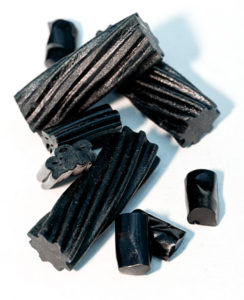 Avoid eating licorice during pregnancy? That licorice is a food to avoid during pregnancy (or only eat in tiny amounts) will be news to many. Most people think of licorice (or liquorice) as a candy, but it can also be used as a herbal medicine that can have negative health effects, especially in large doses (e.g, high blood pressure, loss of potassium). The licorice flavor comes from the root of the plant (licorice root). Licorice contains glycyrrhizin, which is in black licorice candy, and in some chewing gums, ice creams, syrups, soft drinks, supplements, herbal teas, and other products.
Avoid eating licorice during pregnancy? That licorice is a food to avoid during pregnancy (or only eat in tiny amounts) will be news to many. Most people think of licorice (or liquorice) as a candy, but it can also be used as a herbal medicine that can have negative health effects, especially in large doses (e.g, high blood pressure, loss of potassium). The licorice flavor comes from the root of the plant (licorice root). Licorice contains glycyrrhizin, which is in black licorice candy, and in some chewing gums, ice creams, syrups, soft drinks, supplements, herbal teas, and other products.
In 2016, the government of Finland warned against consuming licorice (including black licorice and salty licorice) during pregnancy. In the United States, the FDA does not warn pregnant women about eating licorice or licorice root. The National Institutes of Health (NIH) recommends that pregnant women avoid consuming large amounts of licorice root in food or taking it as a supplement. But how about small amounts of licorice? And what are possible effects during pregnancy?
A recent study in Finland compared children (average age of 12 1/2 years) whose mothers had either consumed little to no licorice during pregnancy or had consumed large amounts of licorice (high glycyrrhizin levels were calculated as more than 500 milligrams per week). Note that 500 mg glycyrrhizin is equal to 250 grams or 8.8 oz licorice. The researchers found that children whose mothers ate large amounts of licorice during pregnancy were about 7 points lower on IQ tests, had poorer memory, and had higher rates of attention deficit/hyperactivity disorder problems than those whose mothers had eaten little or no licorice during pregnancy. High-consumption group girls had earlier and more advanced puberty, and were taller and heavier than those in the low-licorice group.
The researchers wrote that glycyrrhizin results in "glucocorticoid overexposure", which may affect the developing fetus, and the effects persist into early adolescence. The study researchers concluded that pregnant women should be informed that consumption of licorice and other food products containing glycyrrhizin may be associated with harm to their developing baby. A little licorice candy here and there during pregnancy seems to be OK (so don't panic!), but licorice or licorice root is not something that should be eaten or drunk (e.g.,in a tea) regularly. From Science Daily:
Pregnant women should avoid liquorice
A new Finnish study supports food recommendations for families with children in that women should avoid consuming large amounts of liquorice during pregnancy. The limit for safe consumption is not known. In the study, youths that were exposed to large amounts of liquorice in the womb performed less well than others in cognitive reasoning tests carried out by a psychologist. The difference was equivalent to approximately seven IQ points. Those exposed to liquorice also performed less well in tasks measuring memory capacity, and according to parental estimates, they had more ADHD-type problems than others. With girls, puberty had started earlier and advanced further.
The Glaku study carried out by the University of Helsinki, the National Institute for Health and Welfare and the Helsinki and Uusimaa hospital districts compared 378 youths of about 13 years whose mothers had consumed "large amounts" or "little/no" liquorice during pregnancy. In this study a large amount was defined as over 500 mg and little/no as less than 249 mg glycyrrhizin per week. These cutoffs are not based on health effects. 500 mg glycyrrhizin corresponds on average to 250 g liquorice.
Researchers suggest that pregnant women and women planning pregnancy should be informed of the harmful effects that products containing glycyrrhizin -- such as liquorice and salty liquorice -- may have on the fetus. In Finland, this is already reality. In January 2016, the National Institute for Health and Welfare published food recommendations for families with children, in which liquorice was placed in the 'not recommended' category for pregnant women. According to the recommendations, occasional consumption of small amounts such as a portion of liquorice ice cream or a few liquorice sweets is not dangerous.
As a result of animal experiments, the biological mechanism of the effects of liquorice is well known. Glycyrrhizin intensifies the effects of stress hormone cortisol by inhibiting the enzyme that inactivates cortisol. While cortisol is essential to the development of a fetus, it is detrimental in large amounts. It has long been known that glycyrrhizin causes higher blood pressure and shorter pregnancies in humans, but such long-lasting effects on the fetus have not been proven before. [Original study.]
